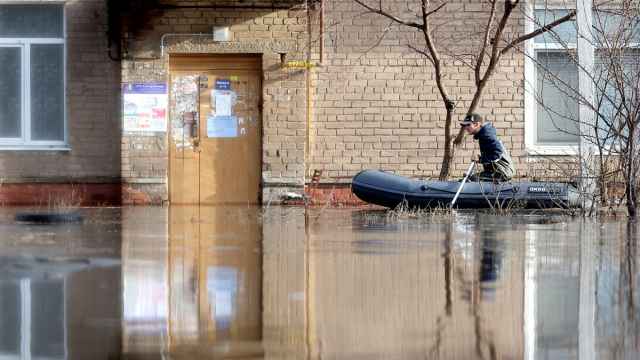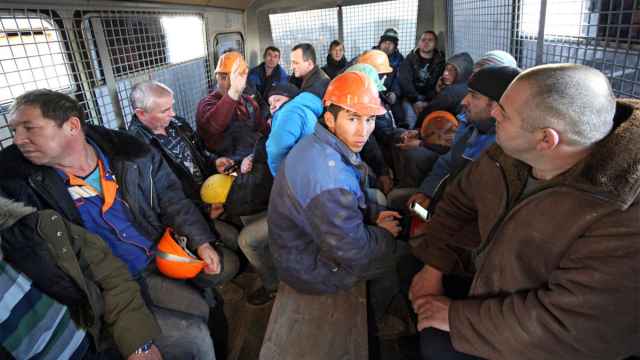Осторожно! Watch out! Be careful!
This week the head of a Russian television channel That Cannot Be Named said that they were checking and double-checking all their donations to make sure that there was nothing untoward — read: foreign — in the batch. In the process they were operating according to the old saying Обжёгся на молоке, дует и на воду: “Once he’s burned his tongue on hot milk, he starts blowing even on water.” We express this in English in almost the same way: Once burned, twice shy.
This reminded me that being careful is a virtue. So how do we talk about caution and care in Russian? Actually, it’s done with just a few root verbs that get modified in various ways.
The easiest thing to say and do is take precautions: принимать/принять меры предосторожности. This is essential when going anywhere with teenagers. In fact, getting prepared for an outing can sound like a military operation: Директор сообщал коллегам: “Завтра десятиклассники идут в театр. Примем меры предосторожности!” (The principle told his colleagues: “Tomorrow the tenth graders are going to the theater. We will take precautionary measures!”) You can also observe (соблюдать) rules already in place: Надо соблюдать все меры предосторожности (We have to follow all the safety measures).
You can also just be careful using one of the first words every foreigner learns in Moscow while riding on the metro: Осторожно! Двери закрываются! (Mind the closing doors!) In Russian you can behave (вести себя) cautiously: Веди себя осторожно! (Be careful!) Or you can exhibit your careful behavior: Наибольшую осторожность проявляли москвичи (Muscovites showed the most caution). I’m not sure what this refers to — anyone who drives a car in the capital will tell you that Moscow drivers are extraordinary risk-takers.
There is also a verb from осторожно – осторожничать, which you’d think would just mean “to be careful” but actually has a bit of a twist to it: it means to be very — if not overly — cautious. This is sometimes the way to play the game in the business world: Наш партнер осторожничает и даёт себе возможность обратного хода (Our partner is playing it very safe and keeping open the option to back out). But being vigilant might be an all-around a good idea: Лучше поосторожничаем, не станем спешить с выводами (It’s better to be on the safe side; let’s not jump to conclusions).
Another very common way to take care is with беречь (to care for someone/something). At parting Russians often say Берегите себя! (Take care!). Taking care of oneself is appreciated on high: Бережёного Бог бережёт (in English: God helps those who help themselves).
Chances are that you also know the reflexive caring verbs беречься/поберечься (“to take care of oneself”). If you don’t, you should because when someone shouts Берегись, that means “Run for cover” or “Watch out!” When you insist that you’re not in any danger, your significant other or parent might say: Ты всё же поберегись. Время какое-то нехорошее. (All the same, watch your back. Times are tough).
Less fraught, but no less dangerous, are the signs you see all over the city by driveways and exits from courtyards: Берегись автомобиля! (Watch out for cars!) You might also see it on a movie theater marquee. If you do, don’t worry about your safety – go in and see a terrific old movie. In any case, when you want to tell someone to beware of something or someone, use беречься/поберечься and the genitive case: Берегитесь удара сзади. (Watch out for a blow from behind).
Now if you don’t like those options, you may also approach personal and institutional safety from the reverse angle, as it were: instead of taking care, don’t take risks. There are lots of ways of saying this, from a general observation — рисковать не стоит (it’s not worth the risk) — to the command Не рискуй своей жизнью! (Don’t risk your life!) Or just plain old: Не рискуй, пожалуйста (Please don’t take risks).
And then, as we saw at the beginning, in some circumstances, being overly careful is not only a virtue, but a necessity.
One of the ways to express being over-anything in Russian is to add the prefix пере- to a verb. Of course, пере- has a couple of meanings, so when you take страховаться (to insure/be careful) and turn it into перестраховаться, it means either to do again —“to re-insure” yourself, that is renew your life or property insurance — or to be overly cautious. Sometimes it’s wise to take extra measures; after all, as a cook noted as she prepared for a dinner party: Может, стоит перестраховаться, сделать лишнее, с запасом (Maybe it’s better to err on the side of caution, make extra, with plenty left over).
And then there is a verb pair for taking care that you should take care with: предохраняться/предохраниться. It means to protect, safeguard, or preserve. You might know it from a word anyone with a computer probably knows: предохранитель (fuse, surge protector, safety lock). The verb can mean to take precautions, to prevent something bad from happening. There are entire departments in corporations dedicated to this, from the techies to the PR experts: Мы обсуждали разные способы предохраниться от нежелательных сценариев (We discussed various ways to prevent unwanted outcomes).
But the tricky bit is that one of the events the verb предохраняться prevents is unwanted pregnancies. It is the common way couples describe taking precautionary measures. Women are still most likely to be the party making the decisions: Женщинам, выбирающим для себя варианты предохранения от беременности, следует обратиться к врачу (When women are choosing a way to prevent pregnancy, they should consult with a doctor).
But to get back to the television station and its excessive caution, this can be described with an all-purpose, curious statement that just uses prefixes and leaves out the verbs: Лучше пере-, чем недо- (Better too much than not enough; better over- than under-). If you want to add a verb, you can put in бдеть (to be vigilant) to get: лучше перебдеть, чем недобдеть (Better to be too vigilant than not vigilant enough).
But Russian being Russian and Russians being Russians, the temptation to add one little letter is irresistible. You can do this, too, but only in the company of close friends and not in the hearing of, say, someone’s easily shocked grandparent. If the coast is clear you can say: лучше перебздеть, чем недобздеть. Here the root verb is бздеть which has three slangy meanings: to fart silently, to be scared, and to talk a blue streak. It basically means “it’s better to do too much than to do too little,” but everyone laughs because, well, the sage advice that “it’s better to overfart than underfart” is hilarious.
Although, you know, it might be good advice. As one of my more disreputable relatives used to say after a spectacular burp: better out than in.






